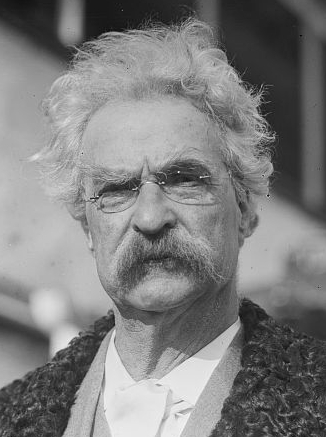Editor's Blog
Ten Blogs We Love (Besides Ours)
I want to make it clear that these ten are not in any particular order. Furthermore, there are plenty of great writing sites; these are just ten of them.
1. Grammar Girl
Mignon Fogarty is a best-selling author, popular podcaster, and an all-around fun grammar teacher to the world. Her site is full of easy-to-remember tips and explanations on writing rules (like what's the difference between i.e. and e.g.), fascinating information about English grammar history (the true meaning of "X-mas"), and other great pieces of information (want to know what the best cheap pens are?). You won't be sorry you visited this site.
10 Writing Tips from Mark Twain
Years: 1835 - 1910
Nationality: American
Notable Works: The Innocents Abroad, The Adventures of Tom Sawyer, Pudd’n’head Wilson, The Prince and the Pauper
Quote: “Always do right. That will gratify some of the people, and astonish the rest.”
Trivia: Twain once received a letter addressed to “Mark Twain, God Knows Where.”
1. "Write without pay until somebody offers to pay."
Don’t write to earn money; you’ll be disappointed by the results. Write because you have to.
2. "Great books are weighed and measured by their style and matter, and not the trimmings and shadings of their grammar."
Don’t know grammar rules? Please don’t let that stop you from writing. If you have something to say to the world, then say it. The quality of your style, theme, and story is what truly matters. This isn’t to say that grammar is not important. Even Twain has advised to practice good grammar. Just don’t get so bogged down that you can’t let your creativity flow. The time you really need to know the grammar rules is when you’re ready to submit your manuscript to publishers – we don’t want to see a document that appears so carelessly made.
3. “Don’t say the old lady screamed. Bring her on and let her scream."
Great advice. Twain is talking about the difference between showing and telling what happens. The old lady is scared? Okay, but why should I care? If you described what led to that scream – what the old lady saw, heard, felt, and how she physically reacted – then I care. I want to experience what she experienced.
10 Writing Tips from Oscar Wilde
Once a week, we will post ten tips on writing from a featured author. Our inaugural author is Oscar Wilde! Come back next week for our next author tips.
Oscar Wilde
Years: 1854 - 1900
Nationality: Irish
Notable Works: The Picture of Dorian Gray, The Importance of Being Earnest, The Ballad of Reading Gaol, The Happy Prince and Other Tales
Quote: “When the gods choose to punish us, they merely answer our prayers.”
Trivia: Wilde fought with Bram Stoker (Dracula) over a woman, Florence Balcome. She married Stoker.
1. “The books that the world calls immoral are books that show the world its own shame.”
Have the courage to let your manuscript explore what you know to be true. If what you write shows some ugly truths, then it’s all the more reason to write it.
2. “Experience is merely the name men gave to their mistakes.”
It’s okay to make mistakes in your writing. Your first, second, and third drafts are not going to be perfect. What is important is what you learn from your mistakes -- how to accept criticism, how to improve writing. The more you fail, the more polished you’ll be the next time you try again. (But please, always, always, always try again.)
3. “To define is to limit.”
Don’t define yourself or your writing. If you want to write only mysteries, that’s fine, but feel free to branch out. If you limit yourself, it stands to reason that you’ll one day run out of stories to tell. Try poetry, songs, memoirs, etc. Be a surprise to yourself and to your audience.
4. “People ask a writer why he doesn’t write like another. If either of them did that he would cease to be an artist.”
PSA from Your Friendly Editor
I have to get this off my chest. Why? Because I’m an editor and I feel that a lot of would-be published authors don’t realize what it means to be an editor. I want to explain it because understanding the job leads to better communication between editor and author in the future.
What We Look for in a Manuscript
 |
Are you a writer who has dreamed of seeing your name in print? Do you have a manuscript you think will make a great book?
Then submit your work to McBryde Publishing!
We look for the following in our authors:
1. Listens to constructive criticism
When we read your submission, we make note of what works and what does not. And believe me, even if your manuscript is the next great American novel, I’m still going to advise you on changes. I don’t do it to be mean or to crush your spirit; I do it because I want your work to be successful. You need a thick skin in this business.
As we like to say here, if you want a rave review, have your mom read it. So, if you’re someone who can objectively look at criticism and ponder how it may help your story, then that is awesome!
2. Wants to learn
Everything I said in Point One? Yeah, take that constructive criticism and learn from it. Did your editor tell you that your dialogue is not believable? Well, okay.
Research what it takes to create believable dialogue. We are happy to give examples and further explain how to better your document.





















